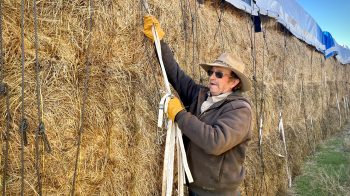Is revised TARP price tag accurate?
TEXT OF STORY
Kai Ryssdal: The bill for the TARP got a little bit smaller this morning. That would be the Troubled Asset Relief Program, of course, also known as the bank bailout. Today, the Treasury Department said it’s going to cost taxpayers $115 billion less than earlier guesses had it. A lot of banks have repaid their TARP funds with interest. So the new price tag for the bailout is just $89 billion. Of course, that’s not counting a lot of the costs.
From Washington, Brett Neely has more.
BRETT NEELY: Before the crisis, Americans were used to 5 percent unemployment. These days, 10 percent feels like the new normal. That gets lost in government reports about what the bailouts cost us.
Martin Baily is a fellow at the Brookings Institution and headed the Council of Economic Advisers under President Clinton.
MARTIN BAILY: We will never get back all that we’ve lost. Hopefully we will get back to full employment, but it’s going to take five to 10 years to do that, so this crisis has been certainly devastating.
And the Treasury’s report doesn’t include the $400 billion lifeline for Fannie Mae and Freddie Mac. The Federal Reserve led the charge on that one.
Mark Zandi is the chief economist of Moody’s Economy.com. He says you should add the rescue of the two mortgage giants in, plus the economic stimulus packages, plus automatic government payments like unemployment insurance.
MARK ZANDI: You take all of that together, and you come up with a number that’s pretty close to $2 trillion, and I think that is more representative of what the costs are to taxpayers from this.
The Treasury arrived at the lower TARP number because of a small profit on its loans. But Karen Petrou at Federal Financial Analytics says that accounting misses a bigger point.
KAREN PETROU: The government should never be an investor in private institutions. That we make a little money on the side has nothing to do with the underlying failure of that policy, crisis-driven as it was.
Now, she says the government is stuck supporting bailed-out companies. But Martin Baily at Brookings says wait a minute.
BAILY: While we certainly had a terrible recession, I think it would have been even worse if we not had the TARP.
Both Baily and Petrou say strengthening financial regulation is the only way we’ll be able to avoid another crisis and more bailouts.
In Washington, I’m Brett Neely for Marketplace.
There’s a lot happening in the world. Through it all, Marketplace is here for you.
You rely on Marketplace to break down the world’s events and tell you how it affects you in a fact-based, approachable way. We rely on your financial support to keep making that possible.
Your donation today powers the independent journalism that you rely on. For just $5/month, you can help sustain Marketplace so we can keep reporting on the things that matter to you.


















